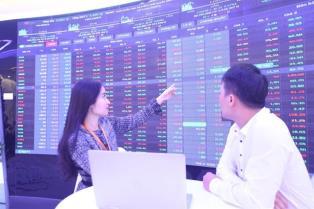In Việt Nam, while digital assets were initially recognised in the legal framework, the State Bank of Vietnam has not yet accepted virtual currencies as legal tender.

HÀ NỘI — Domestic securities firms, investment funds and prominent technology companies both inside and outside Việt Nam are actively positioning themselves to tap into the country’s growing digital asset and cryptocurrency market.
Recently, Dragon Capital announced a proposal for a pilot project to tokenise an exchange-traded fund (ETF). If approved by regulators, investors could purchase fund certificates using various forms of payment, including cryptocurrencies like Bitcoin. With Bitcoin prices surpassing US$120,000 globally and several countries accepting it as a means of payment, the proposal has drawn significant attention.
In Việt Nam, while digital assets were initially recognised in the legal framework, the State Bank of Vietnam has not yet accepted virtual currencies as legal tender.
However, speaking with Đầu tư (Vietnam Investment Review) newspaper, economist Dr Nguyễn Trí Hiếu suggested that it is time for Việt Nam to seriously study this issue, given the rapid global changes driven by technologies such as AI and blockchain.
According to Hiếu, the lack of clear regulations on digital currencies and related transactions leaves them operating in a grey area, which poses risks such as fraud, money laundering and tax evasion.
Some international organisations estimate that Việt Nam’s annual digital asset transaction volume exceeds $100 billion. The country has continuously ranked among the top five globally in Chainalysis’ Global Crypto Adoption Index for the past four years.
In terms of policymaking, the Government has recently shown a marked mindset shift. The Law on Digital Technology Industry, recently passed by the National Assembly, officially recognises digital and tokenised assets. The Prime Minister has instructed ministries to finalise and submit a draft decree for a pilot digital asset market by July 15, 2025.
This policy breakthrough paves the way for investors. Experts held that in the near future, regulated payments using Bitcoin or stablecoins in certain scopes may well become a reality.
Globally, the cryptocurrency industry witnessed a historic milestone last week as the US House of Representatives passed the GENIUS Act, establishing a legal framework for stablecoins, cryptocurrencies pegged to the US dollar, awaiting final approval from President Donald Trump.
Numerous countries worldwide have already adopted or are piloting the use of Bitcoin as a means of payment under varying degrees of regulation.
High-stakes sector draws giants
Việt Nam’s digital asset landscape is increasingly attracting heavyweight players, not only domestic banks, securities firms, asset managers, and tech enterprises, but also global powerhouses.
Last week, Binance, the world’s largest cryptocurrency exchange, announced the “Blockchain for Vietnam” initiative, aiming to position the country as a regional hub for blockchain innovation. As part of the initiative, Binance pledged $1 million to raise blockchain awareness and foster the application to sectors where Việt Nam holds competitive edges.
Binance CEO Richard Teng remarked that Việt Nam holds strong potential for cryptocurrency growth thanks to its youthful population and tech-savvy workforce. It currently ranks among the world’s top 10 countries for digital asset adoption.
Teng added that formalising digital asset regulations in Việt Nam will provide investors with new opportunities. He predicted that once a digital asset exchange is established, it could become one of the most attractive investment platforms for young Vietnamese.
Meanwhile, Will Ross, chief marketing & distribution officer at Dragon Capital Vietnam, noted that instead of focusing solely on traditional assets like gold, real estate, or securities, policymakers should establish a legal framework that reassures investors looking to participate in the digital asset space.
A growing number of domestic and foreign investors are showing interest in building Việt Nam’s digital asset infrastructure and ecosystem. These include SSID, Tether, IDGX, U2U Network, Amazon Web Services (AWS), Binance, Bybit and BingX.
Experts believe that once a national digital asset exchange is operational, Việt Nam could attract substantial global capital, and digital assets and cryptocurrencies will emerge as standout investment channels, particularly as real estate prices remain prohibitively high. — VNS





